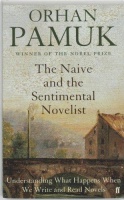kategóriák
- Közlekedés ajánlójegyzék
- Szocreál ajánlójegyzék
- Reklám ajánlójegyzék
- Fotó ajánlójegyzék
- Kínai-japán ajánlójegyzék
- Szentkép ajánlójegyzék
Új árakkal! - Új szentkép ajánlójegyzék II.
- 12 érdekes régiség
 Könyv
Könyv
 Bibliofilia
Bibliofilia
 Régiség
Régiség
 Metszet
Metszet
 Térkép
Térkép
 Fotó
Fotó
 Papírrégiség, Aprónyomtatvány
Papírrégiség, Aprónyomtatvány
 Plakát
Plakát
- Cirkusz
- Modern grafika
- Szocreál
- NER Irodalom
- Egyéb
kosár
üres a kosár
nincs bejelentkezve
Pamuk, Orhan : The Naive and the Sentimental Novelist - The Charles Eliot Norton Lectures, 2009.
- leírás
- további adatok
Understanding What Happens When We Write and Read Novels.
What happens within us when we read a novel? And how does a novel create its unique effects, so distinct from those of a painting, a film, or a poem? In this inspired, thoughtful, deeply personal book, Turkey's Nobel Prize winner explores the art of writing, and takes us into the worlds of the reader and the writer, revealing their intimate connections. Pamuk draws on Friedrich Schiller's famous distinction between "naive" poets-who write spontaneously, serenely, unselfconsciously-and "sentimental" poets: those who are reflective, emotional, questioning, and alive to the artifice of the written word. Harking back to his reading of the beloved novels of his youth and ranging through the work of such writers as Tolstoy, Dostoevsky, Stendhal, Flaubert, Proust, Mann, and Naipaul, he explores the oscillation between the naive and the reflective, and the search for an equilibrium, that lie at the center the novelist's craft. Orhan Pamuk ponders the novel's visual and sensual power-its ability to conjure landscapes so vivid they can make the here-and-now fade away. In the course of this exploration, he delves into the secrets of reading and writing, and considers the elements of character, plot, time and setting that compose the "sweet illusion" of the fictional world. Like Umberto Eco's Six Walks in the Fictional Woods and Milan Kundera's The Art of the Novel, this is a perceptive book by one of the modern masters of the art, a title anyone who has known the pleasure of becoming immersed in a novel will enjoy, and learn from.
What happens within us when we read a novel? And how does a novel create its unique effects, so distinct from those of a painting, a film, or a poem? In this inspired, thoughtful, deeply personal book, Turkey's Nobel Prize winner explores the art of writing, and takes us into the worlds of the reader and the writer, revealing their intimate connections. Pamuk draws on Friedrich Schiller's famous distinction between "naive" poets-who write spontaneously, serenely, unselfconsciously-and "sentimental" poets: those who are reflective, emotional, questioning, and alive to the artifice of the written word. Harking back to his reading of the beloved novels of his youth and ranging through the work of such writers as Tolstoy, Dostoevsky, Stendhal, Flaubert, Proust, Mann, and Naipaul, he explores the oscillation between the naive and the reflective, and the search for an equilibrium, that lie at the center the novelist's craft. Orhan Pamuk ponders the novel's visual and sensual power-its ability to conjure landscapes so vivid they can make the here-and-now fade away. In the course of this exploration, he delves into the secrets of reading and writing, and considers the elements of character, plot, time and setting that compose the "sweet illusion" of the fictional world. Like Umberto Eco's Six Walks in the Fictional Woods and Milan Kundera's The Art of the Novel, this is a perceptive book by one of the modern masters of the art, a title anyone who has known the pleasure of becoming immersed in a novel will enjoy, and learn from.
| állapot: |      |
| kategória: | Könyv > Idegennyelvű könyvek > Angol nyelvű > |
| kategória: | Könyv > Irodalomtörténet > |
| kategória: | Könyv > Esszé, tanulmány > |
| kiadó: | Faber and Faber, (2011) |
| cikkszám / ISBN: | 9780571275915 |
| kötés: | fűzve |
| oldalszám: | 200 |
| könyv nyelve: | angol |

















































 Telefon:
Telefon: E-mail:
E-mail:







